Pardoning Power- Article 161 Does Not Give Any Power To Council Of Ministers: Madras High Court
Upasana Sajeev
25 March 2022 9:46 AM IST

Next Story
25 March 2022 9:46 AM IST
The Madras High Court on Thursday directed the Registry to number the writ petitions filed by Rajiv Gandhi Assassination Case Convict S Nalini for her prerelease without waiting the approval of the Governor and list the same for hearing. The counsel for the Petitioner Mr Radhakrishnan relied on Article 161 and stated that the convict was in prison for a really long time and should...
